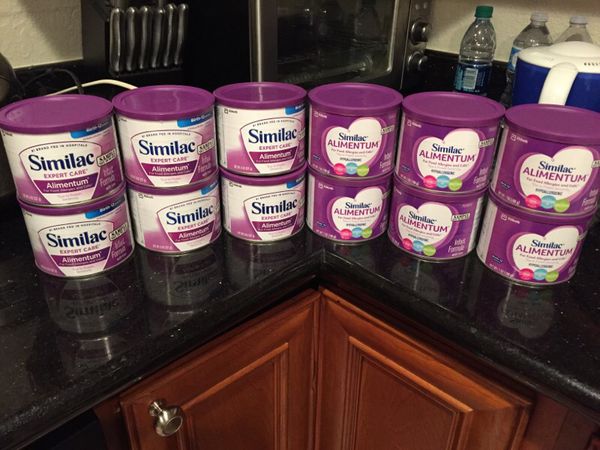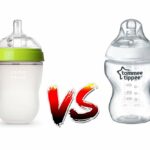Similac Alimentum is one of the few hypoallergenic formulas on the market. It was designed specifically for babies that are fussy due to colic or indigestion because of a protein sensitivity. It also works wonders for little ones that have lactose intolerance. It does still have the ARA and DHA that babies need to grow strong and healthy.
I did a lot of research about this formula as I was on a mission to see if my daughter’s pediatrician would change my grandson’s formula. Similac Neosure comes with quite a few side effects itself, but he needs the extra calories so they never made the switch. However, I did learn quite a few things about the side effects that go hand in hand with Similac Alimentum.
In this article
Similac Alimentum Is Not Dairy Free
Because this formula is recommended for babies that have a milk allergy, most people make the assumption that it is dairy-free. It is not dairy-free or soy-based, though. Instead, the milk protein is broken down so that it is supposed to be easier to digest. This is supposed to help your baby adjust to the milk protein so that they are able to drink cow’s milk when they are older. If your little one has a milk allergy and still suffers from the same symptoms after switching to Similac Alimentum, discuss trying a soy-based formula with your doctor.
Reduces Crying From Colic In 24 Hours
View in gallery
For parents that have colicky babies, this can make Similac Alimentum well worth it. As advertised on their website, Similac Alimentum’s side effects are not all bad. One of the primary reasons that parents make the switch is because it is so effective at reducing crying in babies with colic. It might take longer than 24 hours, but most moms are satisfied with the results, even if it takes a few extra days.
High Price Tag
One of the reasons that parents cringe at the thought of making the switch is because of the high price tag. Similac Alimentum’s side effects are not limited to your baby, this formula can also affect your bank account in a big way. One can of Similac Alimentum costs three times the price of other formulas. There are a few ways to save money, though.
Buy In Bulk
View in gallery
Places like Amazon and Sam’s Club are wonderful for saving money. Instead of buying one small can at a time, shop around for the best prices, and buy in bulk. Larger cans are often cheaper in the long run.
Related Article: Enfamil vs Similac – Which Formula is Best in 2020?
Opt For Powder Formula
There are several options when it comes to buying formula. The ready-made bottles are the most convenient, with already mixed formula coming in at a close second. You wind up paying for that convenience though. These products can cost twice as much as powder formula when you do the math. If you’re stuck with an expensive formula, opt for buying the powder version in bulk to save as much money as possible.
Similac Alimentum Side Effects
Everything can come with side effects, and that includes a formula. Some are designed to relieve constipation yet end up causing gas or diarrhea. It’s important to read the can of formula before purchasing and to discuss any changes with your pediatrician.
Pediatricians see a lot of babies, so they might know a few common side effects that are not listed on the side of the can. Most Similac Alimentum side effects are caused by the additional proteins in this formula. However, they are necessary for babies that have a milk allergy to guarantee that they are getting all the nutrients that they need. These are the most commonly reported Similac Alimentum side effects.
Diarrhea
This is the most common Similac Alimentum side effect. Babies might stop fussing from colic in 24 hours after switching formulas, but you also might just be trading one problem for another. Pay attention to your baby’s diapers after switching formulas to make sure that they do not have too much diarrhea. This can cause the other Similac Alimentum side effects.
Weakness And Fatigue
View in gallery
Although most parents think that this is caused by excessive diarrhea, there are babies that seem weaker than before without diarrhea, which can be puzzling. This side effect is not listed on the side of the can, but it has been listed by parents that have tried this formula, so it is worth making a note of. If your baby goes from happy and holding his head up to too tired and weaker after switching formulas, call the pediatrician.
Excessive Thirst or Dehydration
Along with diarrhea comes dehydration. If your baby has switched formulas and is experiencing diarrhea, they will be thirstier than before. This is because their body is attempting to make up for lost fluids. If this happens, watch for other signs of dehydration.
Signs Of Dehydration In Infants
Dehydration can be dangerous for anyone, especially an infant. If your baby is experiencing any of these symptoms, make sure to contact your pediatrician as soon as possible.
- Dry mouth (lips may appear cracked)
- Less wet diapers
- Eyes appear sunken in
- Excessive thirst
- Irritability
- Sleepiness
- No tears
You know your baby better than anyone else. If he has had diarrhea and also displays any of these symptoms, it’s important to contact your doctor immediately. Severe dehydration can be fatal. It is important to note that most newborn babies are sleepy already, as they need almost 17 hours of sleep a day. Pay attention to your baby to determine if they are sleeper than usual, and look for other signs of dehydration. If you’re feeling concerned or unsure, call your doctor just in case. It’s also a great idea to give your pediatrician a call if your baby has excessive diarrhea that does not go away on its own.
Similac Alimentum is known for causing a few side effects, but mothers can usually enjoy their baby being less fussy and finally sleeping through the night again. Pay attention to the number of wet diapers and watch for signs of digestive issues in the beginning. If there aren’t any, your little one is going to be just fine.
*Disclaimer: This Content is not intended to be a substitute for professional medical advice, diagnosis, or treatment. Always seek the advice of your physician or other qualified health providers with any questions you may have regarding a medical condition.






